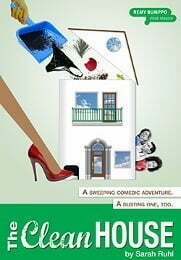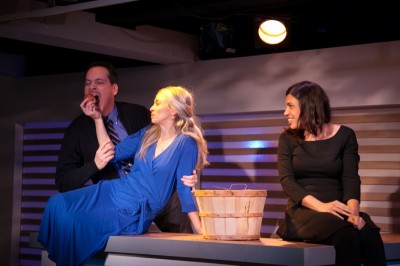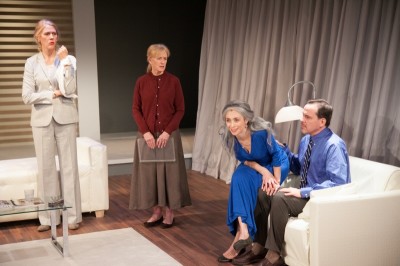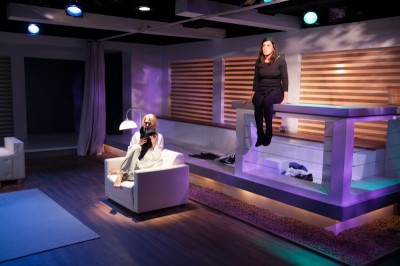The Clean House
Directed by Ann Filmer
Produced by Remy Bumppo
Clean House Messes Up Rationality
Sarah Ruhl’s plays are often about the difficulty of reconciling love with death. She wrote Eurydice, an adaptation of the Orpheus myth that imagined Eurydice enjoying her chance to reconnect with her father in the underworld, and Dead Man’s Cellphone, about a woman who appoints herself executor of a dead stranger’s affairs based on a fanciful and entirely mistaken identity she constructed for him. Her 2004 play, The Clean House, now produced by Remy Bumppo, is an excellent example of both her thematic interest and her playful, though not uproariously funny, imaginative style. It’s a work that resists logical analysis, instead making rhetorical gestures and sometimes heavy-handed emotional appeals. Audience members should go into it with patience to get the most out of it.
The story begins with Matilde (Alice de Cunha), a Brazilian maid, working in the house of a married pair of doctors. Matilde is in mourning for her parents, who were the funniest people in the world, and avoids cleaning because it makes her upset. Lane (Patrice Egleston), the uptight female doctor, does not care for that attitude. However, her sister, Virginia (Annabel Armour), loves cleaning because it gives her a way to take stock of life and gives her a sense of purpose. Virginia takes over cleaning for Matilde in secret.
Virginia and Matilde discover evidence that Lane’s husband, Charles (Shawn Douglas) is having an affair. The other woman is Ana (Charin Alvarez), one of his breast cancer patients. She’s Argentine, sixty-seven, and Charles’s soul-mate. They fell in love when Charles performed her mastectomy. Lane, of course, is astounded her husband would leave her for such an older and infirm woman, while Matilde and Virginia take a liking to her. Charles and Ana are sorry for Lane, but you can’t stop love.
The most frustrating aspect of this play for me is that it is not until the second act, when the love triangle and Ana’s battle with cancer are explored, that Ruhl finds a story to hang her symbolism on. Until intermission, we mostly just watch Lane be subjected to mockery she doesn’t really deserve. She’s so cold her claim to be loved by her patients is entirely unbelievable, but she’s not wrong for wanting her maid to do her job, and Matilde never did explain how to pronounce her name. Egleston’s acting is the most realistic of the cast, because Ruhl has written Lane as the most restrained and therefore least magical character. De Cunha plays Matilde with the axiom that every joke has its victim. It’s not always clear whether she is intentionally rude or just too self-absorbed to care, but I was glad to see this character fade into the background after intermission.
Annabel Armour’s Virginia is kind, but easily excitable and slightly daft. The same is true of Shawn Douglas’s Charles, to the point where director Ann Filmer apparently could not take the notion of him doing surgery seriously. Alvarez’s Ana, as the opposite of Lane, does indeed radiate serenity and easily bonds with others. In a fantastic world, she’s the one who humanizes everyone else. Costume designer Janice Pytel’s boldest and most rewarding decision was providing her with a luminescent blue dress. Grant Sabin’s set design is a modern-style living room so clean it is almost sterile, but becomes cluttered with absurdities. Christopher Kriz’s sound and Charles Cooper’s lighting keeps the play in its magical realm, allowing easy transitions to flashbacks or scenes in a character’s imagination. However, the production is never overwhelmingly surreal, or even all that spectacular.
That the play, which isn’t long, struggles so much in the first act is partly because director Ann Filmer emphasized things that aren’t uncontrollably funny in a world where you can die laughing. But it’s mostly because Ruhl didn’t provide it with enough action. Still, the first act has some laughs, introduces the themes under discussion, and is short. Audience members who stick it out through intermission will find the story of acceptance and laughing in the face of loss the play promises, as long as they entered understanding Ruhl’s anti-realist style to begin with. It’s a style that demands a combination of literary sophistication and openness to direct emotional address while suspending emotional reasoning, but those who are willing to be warmed by it will be.
Somewhat Recommended
Jacob Davis
Reviewed December 8, 2014.
For more information, see The Clean House’s page at Theater in Chicago.
Playing at Greenhouse Theater Center, Theater 3, 2257 North Lincoln Ave, Chicago.




